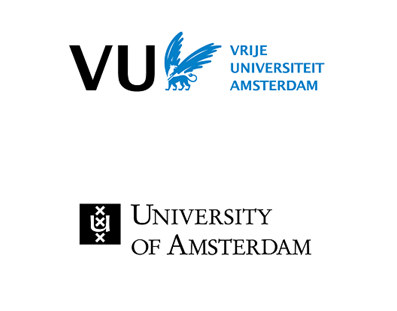Upon completing your survey (5-10 minutes), you receive immediately action-oriented feedback, practical tips, and recommended literature on Artificial Intelligence (AI). In addition, this information is also offered to you in a downloadable report.
Advance your AI Literacy now:
Help increase students' AI Literacy
Since June 2025, a “Survey for Students” is also available.
Tip: Add AIMES to your syllabi or Canvas course and refer to it in your lectures. Feel free to use the text below:
To what extent are you able to use AI responsibly and effectively in your studies?
The AI Maturity in Education Scan (AIMES) will help you. In 5-10 minutes you will gain insight into your AI skills and receive practical tips. Use the AIMES Student Survey.
AIMES: Applications & Content
At VU Amsterdam, AIMES is already used within the University Qualification in Education (UTQ) course (among others). In addition, AIMES also offers other uses to enhance AI Literacy.
AIMES is available to everyone (Open Educational Resource), consult the entire AIMES content: Content & Guidelines for using AIMES, June 2025 (second edition).
Or use AIMES source files (Qualtrics): Involved in AI Literacy in your institution? Explore how AIMES can help:
Stay informed or contribute to AIMES
AIMES is updated semi-annually. Would you like to stay informed about these updates and/or join the AIMES expert panel? Please fill in the AIMES interest form.
About AIMES
Aims of AIMES
AI literacy is essential to ensure quality education. AIMES enables the advancement of AI literacy; the ability to understand, use, monitor, and critically reflect on AI applications.
One Scan: Three Surveys, Ten Items, and Three Maturity Levels
In response to recent AI developments, the AI Maturity in Education Scan (AIMES) was developed to support self-assessment and enhance AI literacy among teachers, program directors, and faculty board members. Each survey consists of ten items, each item offers three descriptions corresponding to three maturity levels. Participants choose the description that most accurately reflects their current level.
The AIMES Downloadable Report: A Personal Reference
AIMES users receive answer-specific, action-oriented feedback, tips, and recommended literature. The feedback and tips of AIMES are compiled using 100+ references from both the VU Amsterdam and the University of Amsterdam as well as organisations as the EU, OECD and UNESCO. All information, including links, can be downloaded in a report at the end of the survey, serving as a personal reference.
By and for Educational Professionals
The AI Maturity in Education Scan (AIMES) is a joint initiative by VU Amsterdam and the University of Amsterdam. AIMES was developed under the leadership of its founder Luuk Terbeek, educational advisor on AI in Education at both universities. During 2024, the first version of AIMES was validated in collaboration with an international expert panel (by applying the Delphi Method).
The foundation of AIMES: The Key Requirements for Trustworthy AI
AIMES is based on the seven Key Requirements for Trustworthy AI (EU, 2019); 1.) Human agency and oversight, 2.) Technical robustness and safety, 3.) Privacy and data governance, 4.) Transparency, 5.) Diversity, non-discrimination and fairness, 6.) Societal and environmental well-being, and 7.) Accountability. By addressing these seven requirements, AIMES is aligned with the EU AI Act. The EU AI ACT is world's first comprehensive legal framework for AI and supports the development of Trustworthy AI.
Towards a Shared Narrative
AIMES serve as a reference for the use of AI at both the course, programme and institutional level. As a result, AIMES facilitates the development of a shared narrative among different key actors. This narrative can guides critical discussions on AI in education. By aligning perspectives, AIMES promotes mutual understanding and collaboration, with the aim of enhancing education with AI.
Ensuring Relevance: AIMES’ Semi-Annual Updates
To stay aligned with relevant developments in AI, AIMES is updated twice a year, with new releases every June and November. The upcoming release will include the addition of a student survey, more evidence-based tips, and further alignment with the EU AI Act. In addition, collaboration will be intensified with coordinators of professionalisation programs and stakeholders of (inter)national AI in education programs.
The Rationale Behind AIMES: An Interview with its Initiator, Luuk Terbeek
Curious to gain more insight into AIMES? Read the interview ‘Assistance with AI literacy with the AI Maturity in Education Scan (AIMES)’ to learn more about its background and purpose.







